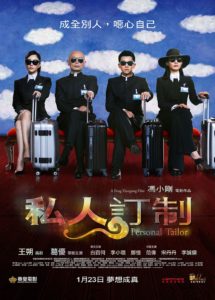Personal Tailor
私人订制
China/Hong Kong, 2013, colour/b&w, 2.35:1, 119 mins.
Director: Feng Xiaogang 冯小刚.
Rating: 7/10.
Satire on money, greed and ambition is a mixed bag but a fine actors’ showcase.
Haikou, Hainan island, southern China, the present day. Yang Zhong (Ge You) heads a company called Personal Tailor 私人订制 dedicated to realising people’s personal fantasies. After staging a WW2 cosplay in which their client, Jenny (Miao Pu), is imprisoned as a spy by German soldiers, the team, which also comprises Xiaobai (Bai Baihe), Xiaolu (Li Xiaolu) and Ma Qing (Zheng Kai), go on to other assignments. Honest Instincts 性本善. A chauffeur to the high and mighty (Fan Wei) says that, with absolute power, he could eliminate official corruption. He hires the team to test his personal incorruptibility by making him a city official who receives personal delegations and offers of financial and sexual bribery. Bloody Vulgar 腔俗血. A  crassly commercial, prize-winning film director (Li Chengru) decides he would like to embrace real “culture” by making an arthouse film, and hires the team to reshape his life and attitudes. Meanwhile, a teenager (Guan Xiaotong) hires Personal Tailor to realise her fantasy of being given a car on her 18th birthday by a wealthy father. Later, the film director falls seriously ill with “high-culture shock” and the team decides on a radical solution involving a blood transfusion with a highly-principled cotton labourer (Wang Baoqiang). Mo’ Money 有钱. The team is hired by a wealthy individual (Li Yong) to thank a woman (Song Dandan) who rescued him from a lake years ago when he jumped off a bridge. They let her experience what it would be like to be a multi-billionaire for a day. All Apologies 道歉. Led by Yang Zhong, the team apologises to Nature for the damage wrought to the country by unfettered business and personal greed.
crassly commercial, prize-winning film director (Li Chengru) decides he would like to embrace real “culture” by making an arthouse film, and hires the team to reshape his life and attitudes. Meanwhile, a teenager (Guan Xiaotong) hires Personal Tailor to realise her fantasy of being given a car on her 18th birthday by a wealthy father. Later, the film director falls seriously ill with “high-culture shock” and the team decides on a radical solution involving a blood transfusion with a highly-principled cotton labourer (Wang Baoqiang). Mo’ Money 有钱. The team is hired by a wealthy individual (Li Yong) to thank a woman (Song Dandan) who rescued him from a lake years ago when he jumped off a bridge. They let her experience what it would be like to be a multi-billionaire for a day. All Apologies 道歉. Led by Yang Zhong, the team apologises to Nature for the damage wrought to the country by unfettered business and personal greed.
REVIEW
Mainland hitmeister Feng Xiaogang 冯小刚 (If You Are the One 非诚勿扰, 2008; Aftershock 唐山大地震, 2010; Back to 1942 一九四二, 2012) returns to contemporary social satire – the genre with which he made his name – for the first time in a decade with Personal Tailor 私人订制. Jabbing at everything from official corruption and property speculation to personal ethics and populism vs. high culture, it again stars Feng’s alter ego, comedian Ge You 葛优, and is imbued with the same dry, northern wit that’s a feature of most of his movies. Tailor also springs from the pen of one of his favourite collaborators, former bad-boy writer Wang Shuo 王朔 (Father 爸爸, 2000; I Love You 我爱你, 2002; Little Red Flowers 看上去很美, 2006) with whom he’s previously worked on the cynical relationship movies Sigh 一声叹息 (2000) and If You Are the One II 非诚勿扰II (2010). Tailor is a mixed, but generally successful, bag: a glossily shot, episodic satire on current-day cupidity in booming China via the story of four people who run a company (Personal Tailor or, more literally, “Custom Made”) that can stage anybody’s dreams – from period fantasies to cultural makeovers or the right ethical choices – for a price.
The film essentially follows the theme of Feng’s first box-office hit, Party A, Party B 甲方乙方 (1997, aka Dream Factory), also starring Ge, in which a group of people constructed film-like scenarios to realise various people’s dreams for a day. However, the roots of both that movie and Tailor actually go back to the now-little-known Three T Company 顽主 (1988, aka The Trouble-Shooters), directed by Mi Jiashan 米家山 and again starring Ge. Pathbreaking in its time, the realistically shot comedy-drama centred on a trio who set up a firm called TTT to selflessly “take on solving your worries, take on resolving your problems and take on the role of scapegoat”. Co-written by Wang and Mi, from the former’s 1987 novel, it satirised the new entrepreneuralism of late 1980s China but with a typically Wang-like sting in the tail: in the end the TTT Company failed as a business and the trio returned to unemployment.
Far more sumptuously shot, Tailor is very much of its time, set in a China that is 25 years on and with the wealth for some to realise their biggest fantasies. Like its clientele, the film glories in its parodies, which are often acute and very funny, but has less of a social conscience than Three T until its closing minutes, when it suddenly gets very preachy about the harm to Nature and the environment by China’s headlong development. In the event, this section is simply a long lead-up to the closing punchline; but it feels jarring nonetheless. The plot of people realising others’ dreams or solving their problems has been the subject of several films (including the 1995 Trouble-Shooters トラブルシューター, aka Trouble with Nango, by Japan’s Harada Masato 原田真人) and, as China’s top-grossing director, Feng is, as always, sending himself up as much as his characters. But Tailor still lacks the edge that his earlier social satires, like Big Shot’s Funeral 大腕 (2001, which was also about creating fantasies) and Cell Phone 手机 (2003), possessed.
Opening with an amusing Nazi spoof (in B&W) that turns out to be a rich woman’s imprisonment fantasy, the film then follows a fairly episodic structure, with three stories that are separately titled and showcase well-known actors (comedian Fan Wei 范伟, plus TV veteran Li Chengru 李诚儒 and comedienne Song Dandan 宋丹丹). The best, and the longest at almost 40 minutes, is Fan’s – a beautifully written, pitch-perfect spoof of government corruption and official jargon, set in the present but with a 1990s flavour, that only runs out of steam in its final section devoted to the client’s sexual fantasy. The second story, centred on a crassly populist director who wants to embrace “culture” by making an arthouse movie that will be “unintelligible and lose money”, starts well but loses its way. That’s a shame, given the subject is Feng’s home territory, but Tailor itself wanders in its middle section, which tries to interweave a smaller story about a teenager who wants to be given a car by her rich daddy on her 18th birthday. The movie gets back on track at the 80-minute mark with its most affecting yarn – a simple woman (Song, excellent) is made a multi-billionaire for a day – before trying to wrap everything up with a clumsy ode to China’s now-spoiled environment.
Wang’s script is strong on detail – individual parodies, clever use of official catchphrases, multiple accents etc. – but lacks any over-reaching arc about the central protagonists as human beings. Three T managed this, but by the end of Tailor the four leads are still ciphers without any personal background, desires or weaknesses, and therefore impossible to identify with. When all is said and done, Tailor is a slick, often very funny farce that’s sometimes repetitive and certainly over-long. Emotionally involving – as Feng’s best films are – it isn’t.
However, just as an actors’ showcase it’s worth the price of admission. Ge doesn’t add much to his established persona of a clever fixer but he does it again with style and authority, anchoring the film. Bai Baihe 白百何, one of China’s hottest young rom-com actresses (Love Is Not Blind 失恋33天, 2011; A Wedding Invitation 分手合约, 2013; The Truth about Beauty 整容日记, 2014), is aces in all her various cosplays, and the most likeable of the team. She and Ge are ably supported by Li Xiaolu 李小璐 (Xiu Xiu: The Sent-Down Girl 天浴, 1998; One Night in Supermarket 夜•店, 2009) and the younger Zheng Kai 郑恺 (Stand by Me 奋斗, 2011). Technically, the whole production is high end, with widescreen photography by Zhao Xiaoshi 赵晓时 (Forever Enthralled 梅兰芳, 2008; Wheat 麦田, 2009) that’s consistently sumptuous, whether in tropical Hainan, watery Zhejiang or urban Beijing. The only technical blip is the English subtitling, which aims for a kind of hip American English and, more seriously, often takes unnecessary liberties with the Chinese (not least in the episode titles).
For the record, Ge’s character has the same name (Yang Zhong) as his role in Three T, while Zheng’s character has the same name (Ma Qing) as another protagonist in Three T. In a further tip of the hat to the earlier film, the original Ma Qing actor, Liang Tian 梁田, cameos here as a hospital doctor.
CREDITS
Presented by Huayi Brothers Media (CN), Huayi Brothers International (HK). Produced by Huayi Brothers Media (CN), Bon Voyage Film Studio (CN), Huayi Brothers International (HK), Beijing Live Planet Film (CN).
Script: Wang Shuo. Photography: Zhao Xiaoshi. Editing: Xiao Yang, Zhang Weili. Music: Luan Shu. Art direction: Shi Haiying. Costume design: Wu Lilu [Dora Ng]. Sound: Wu Jiang.
Cast: Ge You (Yang Zhong), Bai Baihe (Xiao Bai), Li Xiaolu (Xiaolu), Zheng Kai (Ma Qing), Fan Wei (chauffeur), Song Dandan (Dan), Li Chengru (film director), Miao Pu (Jenny), Du Jiayi (producer), Liang Tian (hospital doctor), Li Yong (man in white), Guan Xiaotong (birthday girl), Cao Bingkun (ICAC agent in birthday girl’s fantasy), Cheng Long [Jackie Chan] (film awards announcer), Wang Baoqiang (Qiangzi), Qiu Ye (Empire Club mama-san), Feng Xiaogang (TV reporter).
Release: China, 19 Dec 2013; Hong Kong, 23 Jan 2014.
(Review originally published on Film Business Asia, 25 Dec 2013.)
